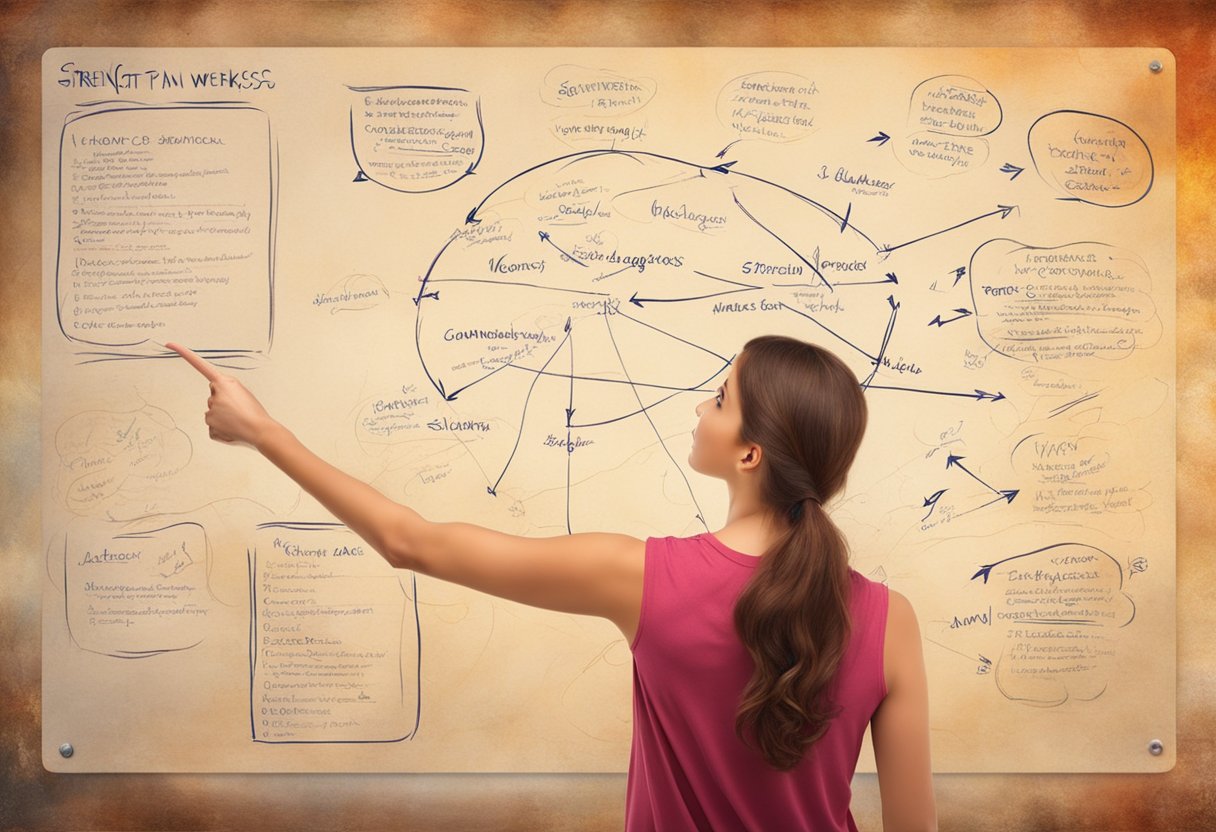Strengths and Weaknesses for Job Interviews: Highlighting Your Qualifications and Areas for Growth
Assessing an individual's strengths and weaknesses during a job interview is a proven technique for employers to gauge a candidate's self-awareness and potential to contribute to their organization. Candidates equipped with a thorough understanding of their skills and areas for improvement can navigate this common interview question with confidence. Highlighting strengths allows applicants to underscore their qualifications and suitability for the role, while tactfully presented weaknesses can demonstrate a commitment to personal and professional growth.

Communication of one's weaknesses is equally crucial and should be handled with honesty and a proactive attitude. It's not just about identifying areas for improvement but also about showing the strategies implemented to overcome these challenges. A balance between technical abilities and soft skills can further strengthen a candidate's case, showing versatility and the capacity to integrate into various working environments. In the context of the interview, candidates may also need to tackle questions related to their experience level, specific accomplishments, and behavior in past job situations, preparing comprehensive responses that reinforce their candidacy.
Key Takeaways
- Presenting both strengths and weaknesses can highlight a candidate's self-awareness and growth mindset.
- Effective communication of weaknesses shows a commitment to improving and learning.
- Balancing technical skills and soft skills is crucial to demonstrate overall capabilities and fit.
Understanding Strengths in Interviews

When individuals prepare for job interviews, recognizing and communicating their strengths effectively can set them apart from other candidates.
Identifying Personal Strengths
To identify personal strengths, one should reflect on past successes and the skills that facilitated those achievements. Individuals might consider feedback from colleagues or assessments that pinpoint areas of proficiency. They should focus on strengths that are consistent and have positively impacted their work.
Examples of Common Strengths
Common strengths candidates may possess include:
- Problem-Solving: Demonstrated through specific scenarios where challenges were overcome.
- Communication Skills: Evident in effective negotiation, persuasion, and clear articulation of ideas.
- Leadership: Highlighted by instances of successful team management or project direction.
- Time Management: Illustrated by balancing multiple projects with efficiency and poise.
Tailoring Strengths to Job Roles
Candidates must tailor their strengths to the job roles they are applying for by matching their personal advantages with the qualities sought by employers. They should study the job description and align their strengths to the responsibilities and objectives of the position, thereby proving their suitability and potential value to the employer.
Communicating Weaknesses Effectively
When discussing weaknesses in an interview, the goal is to convey transparency and self-awareness without disqualifying oneself from the job. It requires a careful balance between honesty and strategy.

Choosing the Right Weaknesses to Share
Selecting weaknesses that are authentic yet not detrimental to the job role is essential. Candidates should avoid personal shortcomings that directly conflict with the job's core requirements. Instead, they might opt for areas of professional development that are tangential to their main responsibilities. For instance, a software developer could admit to lacking in public speaking skills, which is less critical to their role than technical abilities.
Framing Weaknesses Positively
The framing of a weakness is just as important as the weakness itself. Using language that shows personal insight and constructive approach is key. For example, instead of stating, "I struggle with time management," one could say, "I'm currently improving my time management skills through various tools and techniques." This type of response demonstrates a proactive attitude and a willingness to grow.
Demonstrating Growth and Improvement
Exhibitors of potential should outline specific steps they have taken to improve upon a selected area of weakness, turning it into a story of self-improvement. For example, acknowledging a past struggle with delegation, they can also detail how they have since learned to trust their team and better distribute tasks. Concrete examples of past growth inspire confidence in the interviewer that the candidate is dedicated to ongoing professional development.
Emphasizing Soft Skills
In today's job interviews, candidates must showcase their interpersonal prowess alongside their technical abilities. Soft skills can differentiate one candidate from another, proving crucial for successful integration into a workplace.
Importance of Soft Skills in Interviews
Employers increasingly recognize that technical skills are only part of the picture. Soft skills such as empathy, time management, and leadership often play a decisive role in whether a candidate will thrive in a team and adapt to a company’s culture. In fact, soft skills can make up 85% of career success, according to some research.
Highlighting Communication and Teamwork
Communication: In an interview, a candidate should demonstrate strong communication skills by articulating thoughts clearly and concisely. Examples include resolving a misunderstanding at work or leading successful projects thanks to effective dialogue.
- Teamwork: Candidates should use anecdotes to illustrate collaborative abilities. Employers appreciate applicants who can prove they are team players, such as by detailing a group project’s success due to their ability to work harmoniously with others.
Showing Problem-Solving and Adaptability
Problem-Solving: Interviewees should provide specific instances showing their capacity to tackle challenges creatively and efficiently. This can involve situations where they found an innovative solution to a client issue or quickly learned a new software to keep a project on track.
- Adaptability: It’s important for candidates to convey their flexibility and readiness to handle change. Mentioning experiences such as adapting to a sudden shift in project parameters or seamlessly transitioning to remote work can effectively illustrate this skill.
Balancing Technical Expertise
In the context of job interviews, candidates need to showcase a balance between their technical skills and the requirements of the position they are applying for. Here's how to evaluate and align technical expertise for a successful interview.
Assessing Technical Skills
Candidates should conduct a thorough self-assessment of their technical abilities, ensuring they know which skills are their strongest and which may need improvement. For example, a software developer might grade her proficiency in various programming languages or a network administrator could list his certifications and how they apply to potential job scenarios.
Aligning Skills with Job Requirements
It's crucial for candidates to align their technical skills with the job description. They should identify the key technical requirements of the position and match them against their own skill set. Points of alignment might include specific programming languages, software proficiency, or hardware expertise.
Upgrading Technical Know-How
A candidate's technical skills should be current and in line with industry standards. They may consider engaging in continuous education or certification programs. For instance, an IT professional might take a course in cybersecurity to enhance her qualifications for a role that demands up-to-date security knowledge.
By accurately assessing and aligning technical skills, as well as committing to continuous learning, candidates can present themselves as well-rounded and adaptable professionals in job interviews.
Addressing Lack of Experience
When approaching job interviews, candidates should focus on reframing a perceived lack of experience into a showcase of potential and adaptability. This can be achieved by highlighting transferable skills and demonstrating an enthusiasm for growth and learning within the industry.
Turning Inexperience into Potential
A candidate may not have direct experience in a specific role, but they can underscore their potential growth. They should emphasize qualities such as their ability to learn quickly, a fresh perspective they can bring, and the new ideas they are capable of generating. Hiring managers may view inexperience as a chance to mold an employee without the need to unlearn previous habits.
Leveraging Transferable Skills
- Problem-solving: Demonstrate how you've tackled challenges in the past.
- Communication: Highlight any experience where clear and effective communication was key.
- Leadership: Provide examples of leadership, regardless of the context.
Candidates should identify and articulate skills that are valuable across various industries and roles. This helps the interviewer see beyond direct experience and consider how the candidate's background can contribute to the company.
Conveying Eagerness to Learn
Candidates should clearly express a strong desire to learn and commitment to professional development. They can mention specific steps they have taken to close knowledge gaps, such as attending workshops or completing relevant coursework. Showing that they are proactive in learning can often outweigh the drawbacks of having less experience.
Discussing Professional Achievements
When preparing for a job interview, candidates should focus on articulating their past professional achievements effectively. They must select accomplishments that resonate most with the potential employer, demonstrate measurable success, and tie those successes directly to the demands of the job they are interviewing for.
Selecting Relevant Accomplishments
Candidates should carefully choose accomplishments that align closely with the job description. They need to spotlight achievements that showcase skills and experiences which are directly applicable to the new role. For instance, if the job requires leadership, a candidate might highlight a project where they successfully led a team.
Quantifying Successes
It's crucial for candidates to quantify their achievements. This might include statistical growth percentages, monetary savings, or efficiency improvements. For example, a marketing professional could note how their campaign increased sales by 25% or how they grew the social media following by 10,000 users.
Relating Achievements to the Position
Candidates must ensure that the professional achievements they discuss are relevant to the position they're applying for. If an achievement has a direct correlation, they should make that link explicit. For example, an IT specialist who improved system security could relate that to a role requiring robust cybersecurity knowledge and experience.
Preparing for Behavioral Questions
When an interviewer asks behavioral questions, they seek to uncover how a candidate has handled past situations professionally. They not only highlight a person's experience but also showcase problem-solving and decision-making skills. Preparing specific stories in advance can demonstrate competencies and fit for the role.
Using the STAR Method
The STAR method is a structured way of responding to a behavioral interview question by discussing the specific Situation, Task, Action, and Result. This method helps candidates to construct their answers in a compelling narrative form. For example, when referencing a past conflict, a candidate might describe the situation (the context of the conflict), the task (what their goal was), the action they took to address it, and the result of their action.
Reflecting on Past Experiences
Candidates should spend time reflecting on their past experiences and identify scenarios that showcase their strengths and pinpoint their weaknesses. They could create a bullet-pointed list of significant achievements, challenges they have overcome, leadership moments, and times they have dealt with failure or stress. This ensures they don't overlook impactful stories that make them stand out.
Connecting Stories to Strengths and Weaknesses
Linking these stories to their strengths and weaknesses is vital for candidates to provide a comprehensive picture of their capabilities. For example, a candidate might illustrate adaptability and problem-solving by explaining how they identified a workflow issue and implemented a new process that increased efficiency. Conversely, they may discuss a weakness in delegation by sharing how they have taken steps to improve their management skills.
Concluding the Interview
Concluding an interview is as critical as the introduction because it's the final opportunity to leave a strong impression. The candidate should focus on succinctly summarizing their strengths and weaknesses, showing their interest in the position, and posing thoughtful questions.
Summarizing Key Points
A candidate concludes effectively by briefly revisiting the highlights of the conversation. They should emphasize how their strengths align with the job requirements and acknowledge their weaknesses alongside proactive improvement strategies. It's imperative to communicate a coherent message that ties back to the value they can bring to the employer.
Expressing Enthusiasm for the Role
An individual should clearly articulate their enthusiasm for the role and the company. They can convey this by stating specific reasons why they are excited about the opportunity and how they envision contributing to the company's objectives. A genuine expression of interest can differentiate one from other candidates.
Asking Insightful Questions
They wrap up the interview by asking insightful questions that demonstrate their understanding of the role and their strategic thinking about the company's future. This can include inquiries about team dynamics, expectations for the position, or the next steps in the hiring process. Thoughtful questions can signify a candidate's engagement and commitment to the role.
Frequently Asked Questions
These FAQs aim to clarify how job seekers can effectively address the common interview questions regarding their strengths and weaknesses, tailoring their responses to different scenarios.
Can you provide examples of strengths that are relevant to the job you're applying for?
Candidates should highlight strengths that align closely with the job description. For instance, a project manager candidate may stress strong organizational skills and a developer might emphasize proficiency in multiple programming languages.
What are common weaknesses that candidates mention during interviews, and how can one address them?
Job applicants often cite perfectionism or a tendency to take on too much as weaknesses. They can address these by discussing how these traits have impacted their work and the steps they are taking to improve.
How can a candidate effectively discuss their strengths and weaknesses in a job interview?
It's critical to be honest while remaining positive. Discuss strengths with concrete examples and recognize weaknesses without undermining one's suitability for the role. Strategically, one might balance statements about weaknesses with insights into their mitigating efforts—demonstrating self-awareness and a commitment to professional growth.
How should fresh graduates approach the question of strengths and weaknesses in interviews?
Graduates can focus on their educational experiences, any internships, and extracurricular activities to identify strengths and weaknesses. They might highlight qualities such as adaptability, fast learning, and problem-solving abilities, which are valuable in the absence of extensive work experience.
Could you identify five strengths and weaknesses that relate to your professional experiences?
Professionals could list strengths such as effective communication, leadership, technical skills, critical thinking, and teamwork. Weaknesses could include dealing with criticism, reluctance to delegate, impatience, overcommitment, or discomfort with public speaking. These should be selectively shared based on relevance to the job requirements.
What strategies can be employed to give a positive spin on your weaknesses in an interview?
Candidates can reframe weaknesses as areas for growth, stating how they're actively working on these areas. For instance, someone who has trouble saying "no" may talk about learning to set better boundaries to improve time management.

Get a higher quality resume format
Our Resume Builder ensures best practices, logic, formatting standards and job matching opportunities from thousands of job boards and portals around the world.
By clicking Start Your Resume, Your are agree to our Terms of use and Privacy Policy
 India's
premier resume service
India's
premier resume service






